
Eschscholzia californica, the California poppy, golden poppy, California sunlight or cup of gold, is a species of flowering plant in the family Papaveraceae, native to the United States and Mexico. It is cultivated as an ornamental plant flowering in summer, with showy flowers in brilliant shades of red, orange and yellow. It is also used as food or a garnish. It had various uses in indigenous herbalism. It became the official state flower of California in 1903.
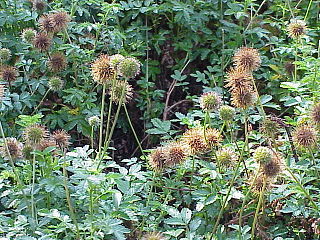
Acaena is a genus of about 60 species of mainly evergreen, creeping herbaceous perennial plants and subshrubs in the family Rosaceae, native mainly to the Southern Hemisphere, notably New Zealand, Australia and South America, but with a few species extending into the Northern Hemisphere, north to Hawaii and California.

Aesculus californica, commonly known as the California buckeye or California horse-chestnut, is a species of buckeye native to California and southwestern Oregon.
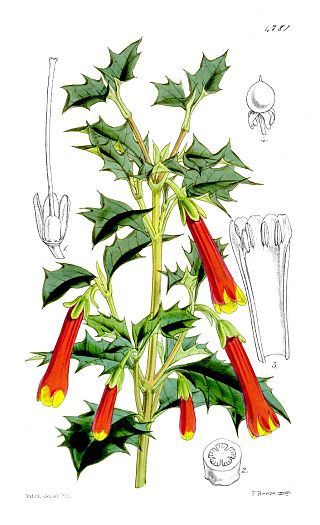
Desfontainia is a genus of flowering plants in the family Columelliaceae, though it was placed formerly in Loganiaceae, Potaliaceae, or a family of its own, Desfontainiaceae.
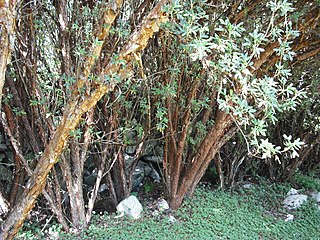
Polylepis racemosa is a species of small tree in the family Rosaceae. It is endemic to Peru, Bolivia, and Ecuador. It is threatened by habitat destruction. The International Union for Conservation of Nature has assessed the conservation status of this tree as "vulnerable".

Citronella mucronata, the huillipatagua, naranjillo, or Chilean citronella tree, is an evergreen tree in the family Cardiopteridaceae. It is endemic to Chile and grows in the Chilean matorral region of central Chile from 30º to 40° south latitude.
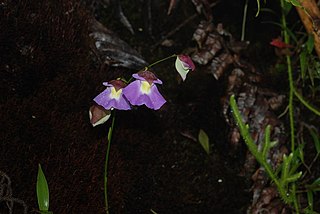
Utricularia unifolia is a species of perennial, medium-sized carnivorous plant that belongs to the family Lentibulariaceae. U. unifolia is native to Central America and western South America. It was originally published and described by Hipólito Ruiz López and José Antonio Pavón Jiménez in 1797 and later considered a synonym of Utricularia alpina until Peter Taylor's 1989 monograph on the genus where he restored the species as distinct from U. alpina. It grows as a terrestrial or epiphytic plant on moss-covered trees, rocks, or banks in cloud forests at altitudes between 2,000 m (6,562 ft) and 3,000 m (9,843 ft). U. unifolia usually produces only one leaf, which is where the species epithet "unifolia" is derived from.

Madia sativa, known by the common names coast tarweed and Chilean tarweed, is a species of flowering plant in the family Asteraceae found in parts of western North and South America.

Chaetanthera is a genus of South American flowering plants in the family Asteraceae native to Argentina, Bolivia, Chile, and Peru.
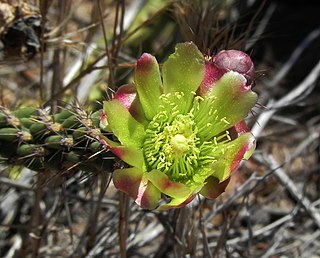
Cylindropuntia californica is a species of cholla cactus known by the common name snake cholla. It is primarily found in Baja California, Mexico and the southernmost part of California in the United States. It is characterized by a short, decumbent habit, yellow-green flowers, elongated stems, and short spines. It is mostly found in coastal sage scrub and coastal chaparral habitats, but two varieties in Baja California can be found in foothills and deserts. In California, variety californica is regarded as a rare and threatened plant, with a California Native Plant Society listing of 1B.1, in part due to its limited number of occurrences and threats from development. It formerly was considered to have a larger range due to the inclusion of Cylindropuntia bernardina within it as the variety parkeri.

Orobanche californica, known by the common name California broomrape, is a species of broomrape. It is a parasitic plant growing attached to the roots of other plants, usually members of the Asteraceae.

Tillandsia capillaris is a species of flowering plant in the family Bromeliaceae. This species is native to southern and western South America.

Tillandsia virescens is a species of flowering plant in the family Bromeliaceae. This species is native to Argentina, Bolivia, Chile and Peru. It was first described in 1802.

Jarava ichu, commonly known as Peruvian feathergrass, ichhu, paja brava, paja ichu, or simply ichu, is a grass species in the family Poaceae native to the Americas. It is found growing in a vast area: Mexico, Guatemala, Costa Rica, El Salvador, Venezuela, Bolivia, Colombia, Ecuador, Peru, Dominican Republic, Chile, and Argentina. It is a common grass of the Andean altiplano. It is used as fodder for livestock.

Escallonia rubra, called redclaws and red escallonia, is a species of flowering plant in the family Escalloniaceae. It is native to southern Chile and neighboring areas of Argentina.

Acaena ovalifolia is a species of flowering plant belonging to the family Rosaceae. Its native range is Western South America to Falkland Islands. The plant has been used to treat unspecified medicinal disorders.

Tristerix verticillatus is a species of flowering plant in the family Loranthaceae. It is found in Argentina, Bolivia, and Chile.

Mucronea californica is a rare species of annual plant in the family Polygonaceae known by the common names California spineflower or California mucronea. An ephemeral plant found growing in the sandy microhabitats of coastal sage scrub, chaparral and dunes, this plant is threatened by the urbanization and development of its viable habitat and has been locally extirpated over much of its range. It has small, white to pink flowers that top inflorescences spined with awns.

Malesherbia humilis is an annual herb that grows in the subtropics of northern and central Chile to Argentina.
Malesherbia lirana is a perennial herb whose native range is from Argentina and Chile. The species has racemose inflorescences that are 2 - 3.9 cm in size and cream colored petals. It flowers in spring to late summer.




















